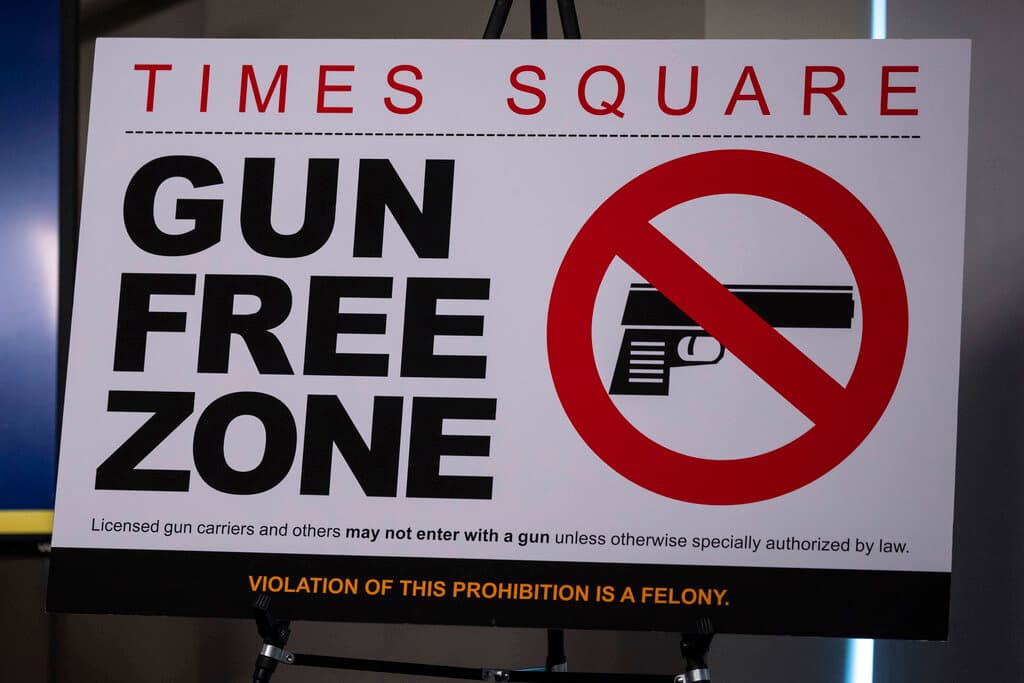Second Amendment Advocates Hope Judge Will Stop New State Gun Regulations
The new restrictions, enacted in response to a landmark Supreme Court ruling on Second Amendment rights, will likely make it harder to receive a concealed carry permit in much of New York.

In a lawsuit that could decimate New York State’s newest gun legislation, Second Amendment advocates are hoping a court will halt the new restrictions before they go into effect tomorrow.
The suit, filed in the federal court at Albany by gun rights groups, including Gun Owners of America, against the state police superintendent, Kevin Bruen, argues that the state’s new Concealed Carry Improvement Act, set to go into effect September 1, is “blatantly unconstitutional.”
The act was signed by Governor Hochul in July, following a special session of the state legislature following the Supreme Court’s ruling on New York State Rifle and Pistol Association v. Bruen, where the court declared New York’s Sullivan Act unconstitutional.
The Sullivan Act served as New York’s main concealed carry regulation for over a century. The court found that the law’s requirement for applicants to show “proper cause” for a concealed carry permit violated the Second Amendment.
The “proper cause” requirement meant that applicants had to demonstrate a specific need for a concealed carry permit beyond simply self defense, and local police precincts had almost unilateral discretion in defining what a “proper cause” was.
The new Concealed Carry Improvement Act creates new restrictions about carrying weapons in “sensitive locations” such as public transportation, public demonstrations and rallies, libraries, bars, schools, and all private property by default.
Times Square will also be a gun free zone of note, and the borders of the famous New York City interchange will be defined more generously, stretching from 6th Avenue to 9th Avenue and from West 40th Street to West 53rd Street.
There will also be new objective application requirements for concealed carry permits, including 16 hours of in-person training, an 80 percent or better score on a written exam, and certification that applicants do not have any convictions that would preclude gun ownership.
Alongside these requirements, applicants will be required to disclose the names of anyone that they live with, including partners and minors, as well as at least four character references.
Applicants will also be required to list any and all social media accounts they have had over the last three years as part of the state’s efforts to identify possible red flags.
The last requirement is also the subject of the lawsuit, with plaintiffs arguing that the law violates their First Amendment rights.
Another lawsuit filed in federal court at Manhattan by an attorney representing himself, Jon Corbett, argues that the pistol permit requirements destroy online anonymity.
Because of the level of discretion previously afforded to local precincts, these new restrictions will likely make it harder for applicants to receive a concealed carry permit in much of New York.
As the Sun reported last month, the new permit policy sparked a rush to apply to upgrade sportsman’s licenses to concealed carry permits, backing up county clerks offices across the state.
In some precincts, lines were so long that the earliest appointments for new applications were well into the spring of 2023, months after the new policies are set to take effect.
Though these new laws are the subject of litigation, a lawyer for the governor’s office, Elizabeth Fine, argues that the “moral character” aspects of the New York law — referring to the reference and social media requirements — are constitutional.
She says that “the moral character standard was not an issue in the Supreme Court, and it’s been issued in other states.” The other restrictions in the new law appear to be endorsed by the Court’s ruling.
In the opinion of the court, Justice Clarence Thomas wrote that there is a historical precedent for banning guns in “sensitive places,” like courthouses or other government buildings. He argued that “modern regulations prohibiting the carry of firearms in new and analogous sensitive places are constitutionally permissible.”
He did, however, note that there would be no historical basis “for New York to effectively declare the island of Manhattan a ‘sensitive place.’”
For their part, New York’s Republican leaders are making good on a promise by the state’s party chairman, Nicholas Langworthy, to fight the new restrictions in court.
“The moment Democrats passed this outrageous bill, I vowed to fight them in court,” Mr. Langworthy said in July, promising to “build a coalition and bring a winning case that will stop this law in its tracks.”

